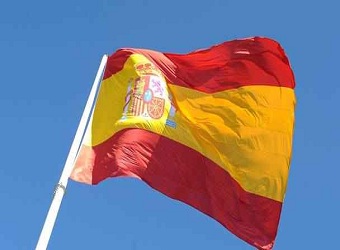Despite various attempts by the Spanish government to stop a symbolic referendum on independence from being launched in the wealthy region of Catalonia next Sunday, pro-separatists look set to hold a vote regardless.
The national government in Madrid has said it will deploy police to prevent an independence vote on October 1, with orders to take over any polling booths that are set up. The government and country’s constitutional court have ruled that the vote is unconstitutional, although that has not stopped a past similar “symbolic” vote in 2014.
Madrid has already ordered police raids on regional government offices, seized election material, and made arrests relating to the vote, but this has not stopped Catalan officials, who say the vote will take place come what may. Protests have also taken place in Barcelona, the region’s largest city, in response to the police action, with protesters chanting “We will vote!”
Although most polls show that the majority of Catalans favor remaining a part of Spain, there is anger at the Spanish government for not allowing an official vote on the matter and for the perceived suppression of a democratic process — a moot point in a country that experienced military dictatorship for much of the 20th century.
PR Disaster
Although it’s uncertain how organized and widespread any ballot will turn out to be on Sunday — and analysts are split over whether anything will take place — it’s widely seen as a constitutional crisis for the Spanish government that is set to rumble on.
“Regardless of turnout or the result this weekend, the Catalan referendum is becoming yet another PR disaster for the political establishment in Spain,” Stephen Gallo, European Head of FX Strategy at BMO Financial Group, said in a note Wednesday.
“Although the Catalan referendum is considered unconstitutional, the defensive posture adopted by Madrid is only adding more fuel to the fire.”
Aside from deploying police and seizing any documents or paraphernalia that it thinks is related to holding a referendum vote, Madrid has sought the moral high ground too, issuing a statement on its government website this week in which it attempts to undermine the legitimacy of any vote.
“Articles 1 and 2 of our Constitution enshrine the principles of national sovereignty, which resides in the Spanish people as a whole, and of national unity, in line with the fundamental precepts of advanced democracies. The exercise of an alleged right of self-determination by a part of the Spanish territory is not allowed in the Spanish Constitution,” the government said.
It added that “in recent weeks, the secessionist defiance promoted by certain institutions in Catalonia has escalated in a way that underscores its authoritarian, arbitrary and antidemocratic nature, and its intention to openly contravene the prevailing legal framework.”
Police deployed
Madrid is not taking any chances on October 1, with between 3,000 and 4,000 state police officers from around Spain being deployed to Catalonia. On Tuesday, the national government said police would take control of any voting booths in Catalonia to thwart the region’s planned independence referendum. Not everyone is convinced that will be necessary, however.
“The referendum, as such, is very unlikely to take place, at least, a legally legitimate referendum,” Antonio Barroso, managing director of Teneo Intelligence, told CNBC Wednesday. “The central government has taken a lot of steps to prevent that. What happens next depends a lot on the cohesion of the pro-independence government.”
For his part, Prime Minister Mariano Rajoy has told Catalonian politicians to “stop this radicalism and disobedience.” Speaking in a televised address last week, he said: “Don’t go ahead. Go back to the law and democracy. This referendum is a chimera,” he said, referring to a thing that is aspired to but seemingly impossible to achieve.
Fighting on
The independence movement is long-standing and deep-rooted in Catalonia, however, and attempts to remove its popular leaders and figureheads have not stopped the movement. Earlier this year, Catalonia’s ex-president Artur Mas was banned from holding public office for two years, and was given a hefty fine, for disobeying Spain’s constitutional court over the non-binding independence vote in 2014.
Now, Spain’s chief public prosecutor has said Catalonia’s current president, Carles Puigdemont, could be arrested for civil disobedience, abuse of office and misuse of public funds for pressing ahead with preparations for the October 1 referendum, according to Reuters.
Still Catalonia’s pro-independence politicians have vowed to fight on. Teneo Intelligence’s Antonio Barroso said the regional government could take several next steps.
“They could declare independence unilaterally which would lead to a harsh intervention by the government of Mariano Rajoy, or they could actually call for elections and kick the can down the road but keep on pressuring the central government in this fight for independence,” he said.
If a vote does go ahead — whether this Sunday or in the future — “the destabilizing effect on the economies of Catalonia and Spain could be very large,” according to Capital Economics’ Assistant Economist Oliver Jones. “However, given the political and legal barriers to Catalan secession, a compromise that simply grants the region more autonomy appears far more likely than independence,” Jones said.
Source: CNBC
